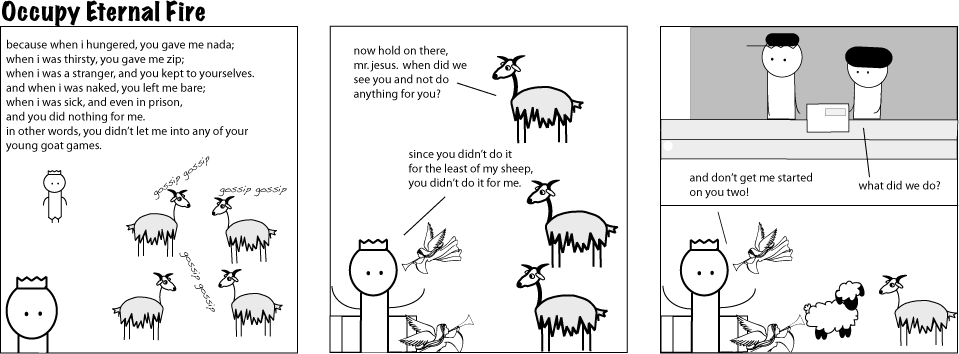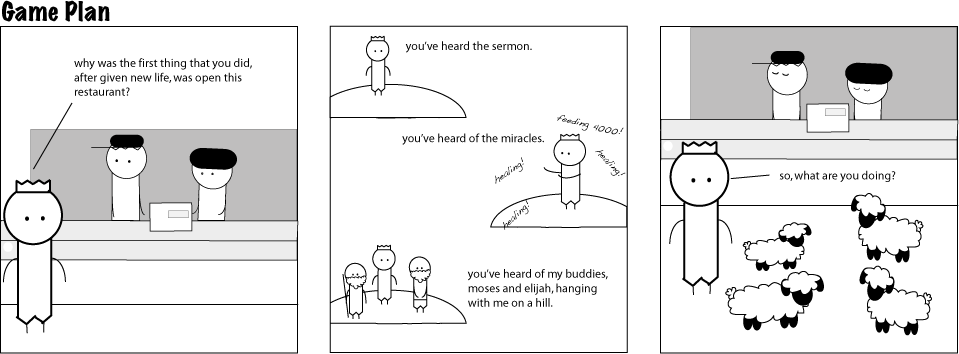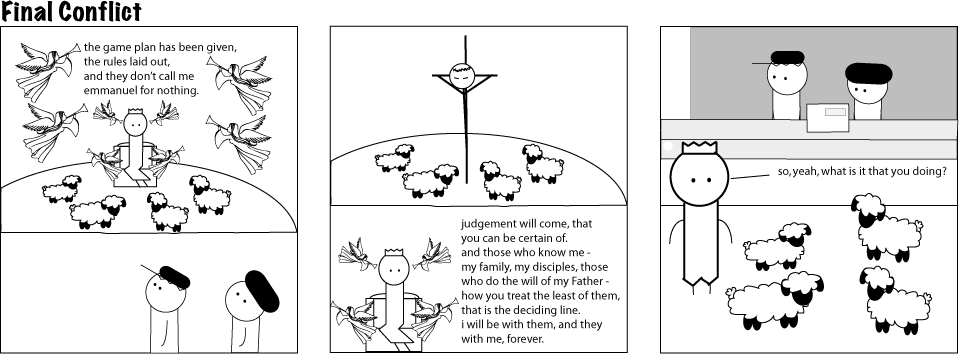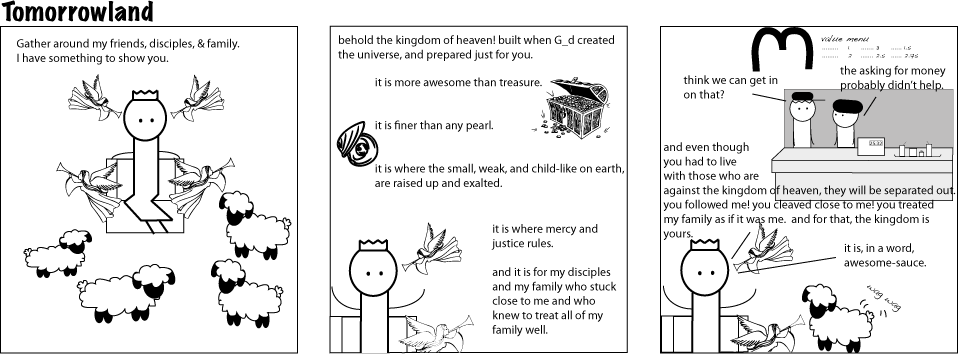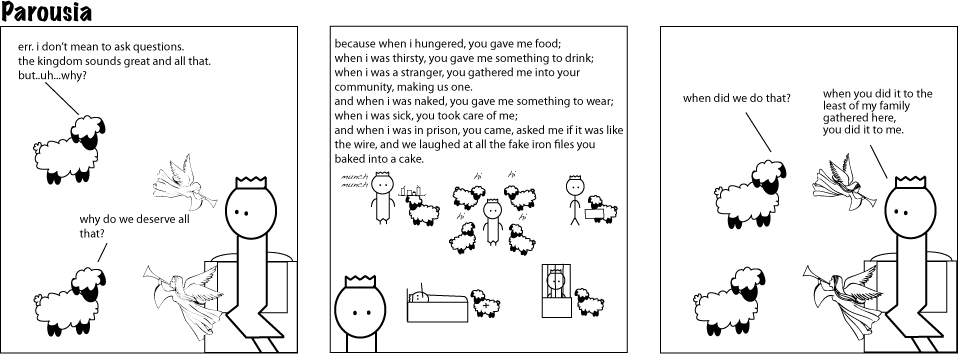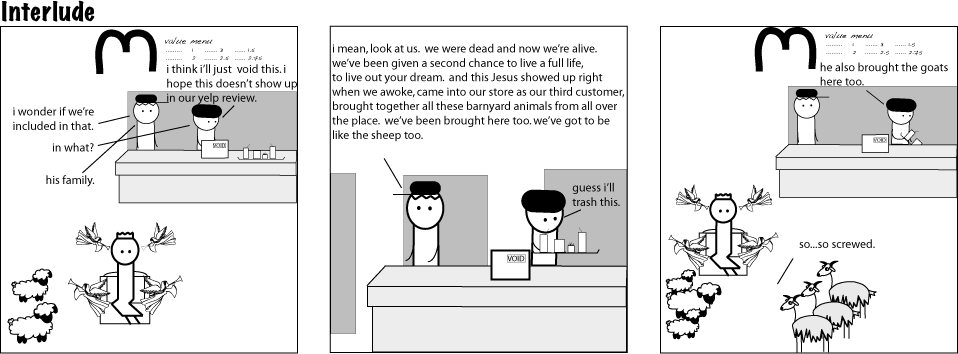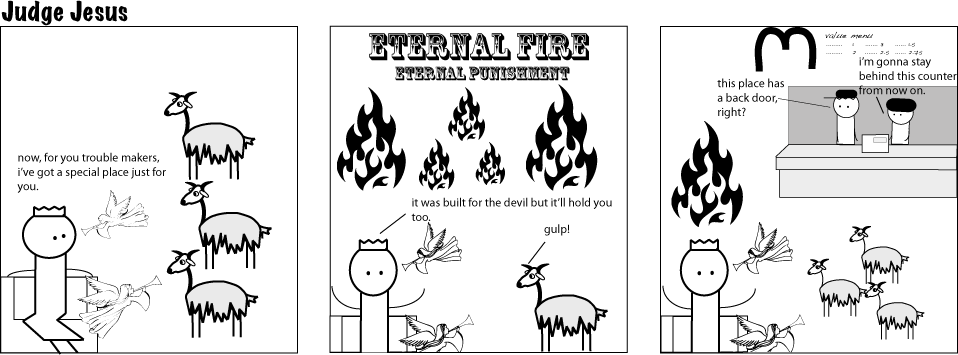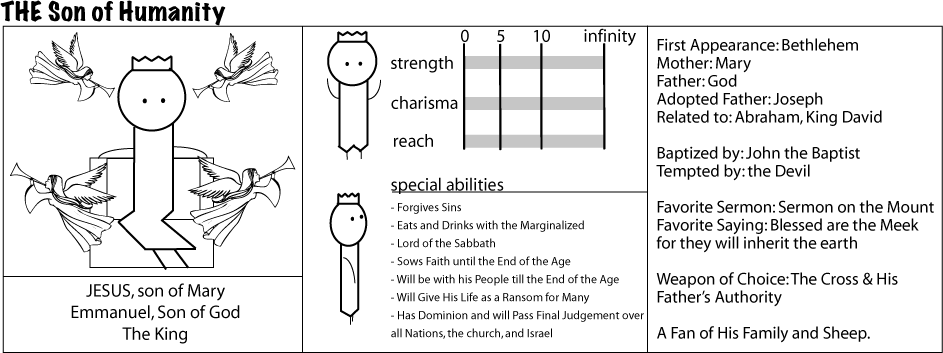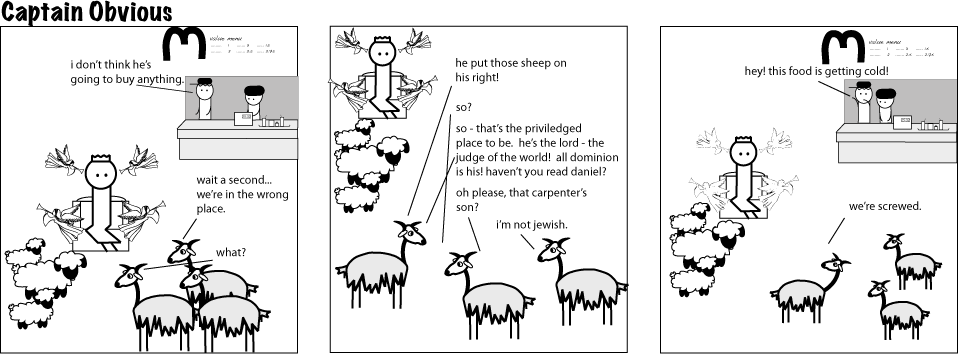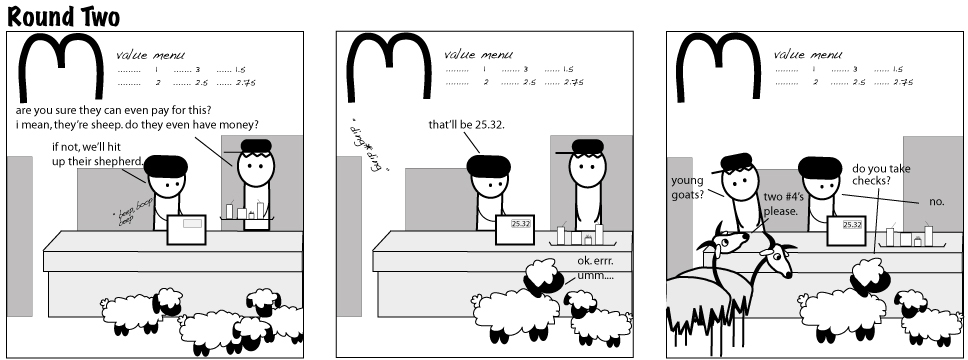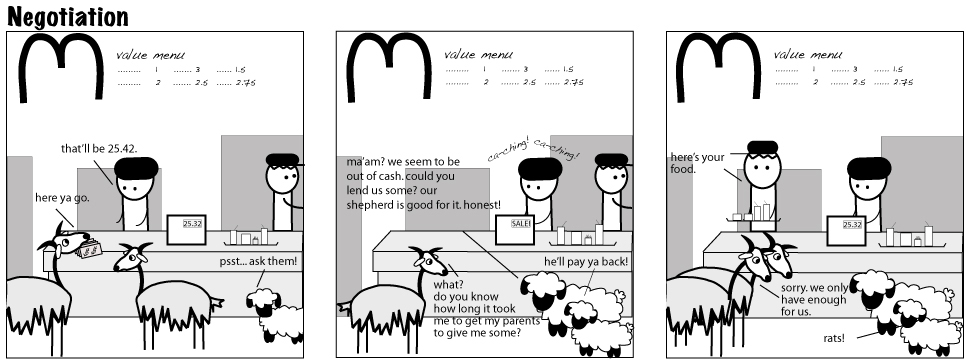Not to toot my own horn, but if you watch CBS on Christmas Eve, you’ll see me photobomb quite a few scenes. That’s what they get for filming the Christmas Service at General Theological Seminary this year.
Category: Faith
Change
I really do need to be better at documenting all the advice/reflections/anecdotes pastors share with me while I go through my journey towards ordination. It is getting to the point where I’m forgetting things. That doesn’t mean that all the advice that I get is any good but there are a few bits that have stuck with me.
Last week, in a one-on-one supervision session with a former Metro-New York Synod Bishop, we were talking about change in churches. Actually, we were talking about an article that was forwarded to him by Brian McLaren called “Seminary is Not the Problem.” It came out a month ago and we chatted about it. I’m sure, if I look, I would find all the things that other people have already said about the article and that I’m not necessarily sure that I could add anything to the conversation. I don’t necessarily agree with his conclusions (and I think part of his conclusions could be theologically unsound) but I understand where he is coming from. In my Church and Conflict class, half the students were currently ordained and in parishes that were struggling with conflict. Some were taking it again as a refresher. The issues that McLaren pointed out are real.
In our little one-on-one, the Bishop told me his story. He mentioned a church he took the helm of once in Brooklyn. It was an old, proud, Norwegian, located in a neighborhood that had changed, and it had three services in three different languages. When he came to the church, he did what our current Bishop informs all pastors who end up somewhere new: don’t change anything in the liturgy for at least a year. So, the former Bishop used the same language, kept the words of the service the same, and didn’t change the location of anything in the Nave. He did everything he could to not change how worship worked.
About a year into his time at the church, he was in a conversation with some folks and the topic of change came up. The Bishop asked how the folks were experiencing worship. “Oh”, they said, “you changed everything.” He was dumbfounded. The words were all the same, the order of worship was the same, and he thought everything was as close to how it was when he first arrived. But the simple fact was that just by being there, the liturgy changed. He said words differently, preached differently, and his whole personally moved through the liturgy differently. Just his presence made the liturgy change.
I don’t think I’ve ever heard that point made before. The “don’t change anything for a year” is advice that I’ve heard all the time but the point that it will change because the pastor is change, that’s a little new to me. Or at least, I’m really hearing it for the first time. It makes me wonder what I’m gonna bring to where ever I end up and how much “change” I’ll be carrying with me.
Unwanted Pastoral Care between Bus stops
Today was one of those days where I didn’t really want to talk to anyone. But, argh, sometimes, it just happens and I can’t stop it.
One of the great things about New York is how easy it is to isolate yourself in your own private world even if you are traveling in a small moving vehicle with fifty other people next to you. Find a seat or a place to stand, pop in your earbuds/headphones or open a book, and that’s it – you are gone to the world. The walls are set, the boundaries drawn, and the moat laid; you can enjoy your small piece of individualized exclusion until you get to your destination. That was something I really felt like I needed around noon today. I just was sick of people today.
Chula (my cat) and I were on our way to visit a friend where Chula will be spending the next few weeks on vacation. I got on a bus, found a seat, opened my book, and kind of ignored everyone while my iPod blasted mashups into my ears. When I was at the stop before my destination, I got up, picked up my cat and her things, and moved towards the door, to quicken my departure once I got to where I was going. As I moved into position, an older gentleman, shorter than me, and with a weird mole or growth on his upper lip, noticed me. He told me he was getting off at the next stop and I said I was as well and explained that’s why I moved. My earbuds were still in, and I was doing my best to not engage him but that didn’t work. He kept talking and I found myself responding back.
Honestly, I really tried not too. I really tried to just grunt responses back. But I just couldn’t. It seems part of me turned into chaplain mode. We talked about apartments and how he recently was evicted. He told me he was struggling to get on disability. He told me his wife of sixteen years had just recently died “but at least she didn’t get to see the eviction.” We stood next to each other for only five minutes but he kept talking and I kept asking questions and actively listening to him. When our stop came, he held the door open for me, and I wished him luck on everything and then we parted ways.
Did I do a good job engaging with him? Oh Lord, no. Over the last year or so, I’ve started to develop my inner dialogue that is able to reflect on what my mouth is doing. There were things I missed or purposely didn’t engage in. I didn’t ask how he felt or dig deep even though I could see that he was trying to get me to travel down those routes. I really don’t know if he felt like I actually listened to him. My inner dialogue knew all of this and told me “to do better” but I ignored it. And the fact that I didn’t do a little better…well, that bugs me even five hours later. I didn’t do horrible, mind you, as the guy sounded like he had hope. But I could have done better and there was an opportunity here for some real pastoral growth. But I let that slide right on by. Sigh. If that was an angel or Christ, I hope they don’t hold my lack of effort against me*.
*As a side note, I really am not a fan of the meeting-Christ-in-stranger imagery because I find it very overused and I don’t necessarily agree with it all the time. But it is hard to NOT think that when situations like this occur. Oh well.
Stick a Fork In ME, I am……well, this semester is done.
Yesterday, at 11:30 am, I finished my first semester at the General Theological Seminary of the Episcopal Church. My final final was the day before (biblical greek) but I still had to turn in my field education evaluation and it was due at noon. 30 minutes to spare.
Go me.
I’ve been doing some self-reflection about the semester, trying to pick up some of the things I really learned during the semester. It honestly feels like I didn’t learn much though after my spring semester at LTSP and CPE, it’s hard to follow up those kinds of events. I needed to wind down and I guess this was that kind of semester.
But I did get one important piece of information a few weeks ago. In my preaching class, everyone met one-on-one with the professor to watch a video of our sermons. While reviewing my extemporaneous homily, she noticed that I would trail at the end of sentences when I was preaching but not when I was reading the text. She said something to the effect “you know, when you preach, own that authority that you have.” I view scripture as authoritative and I’ve learned how to read it loud and proud. But when it comes to my own words…well…I don’t view it as authoritative. And not that I most likely ever will. But just being able to own the words that I’m speaking…hmm. It’s good advice. And, from my whole semester at GTS, that’ll probably be the thing I take with me. That and how being in Episcopal seminary has made me waaaay more Lutheran (kinda like how having a theologically liberal supervisor – and I mean that in the old-fashion-christianity-is-bigger-than-needing-to-believe-in-God kind of way – has made me a tad more theologically conservative). So there’s that.
Occupy Eternal Fire
Nuestra Señora de Guadalupe
 He [Juan Diego] said to him [the Bishop]: “My owner and my lord, I have accomplished what you asked for; I went to tell my Matron, my Owner, the Lady from Heaven, Holy Mary, the previous Mother of God Teotl, how you had asked me for a sign in order to believe me, so that you might build her temple where she is asking you to erect it. And besides, I told her that I had given you my word that I would bring you a sign and a proof of her will that you want to receive from my hands. When she received your though and your word, she accepted willingly what you asked for, a sign and a proof so that her desire and will may come about.
He [Juan Diego] said to him [the Bishop]: “My owner and my lord, I have accomplished what you asked for; I went to tell my Matron, my Owner, the Lady from Heaven, Holy Mary, the previous Mother of God Teotl, how you had asked me for a sign in order to believe me, so that you might build her temple where she is asking you to erect it. And besides, I told her that I had given you my word that I would bring you a sign and a proof of her will that you want to receive from my hands. When she received your though and your word, she accepted willingly what you asked for, a sign and a proof so that her desire and will may come about.
And today when it was still night, she sent me to come and see you again. But I asked her for the sign and the proof of her will that you asked me for and that she agreed to give to me. Immediately she complied.”
“She sent me to the top of the hill, where I had seen her before, so that there I might cut the flowers from Castile. After I had cut them, I took them to the bottom of the hill. And she, with her precious little hands, took them; she arranged them in the hollow of my mantle, so that I might bring them to you, and deliver them to you personally. Even though I knew well that the top of the hill was not a place where flowers grow, that only stones, thistles, thorns, cacti and mesquites abound there, I still was neither surprised nor doubted. As I was arriving at the top of the hill, my eyes became fixed: It was the Flowering Earth! It was covered with all kinds of flowers from Castile, full of dew and shinning brilliantly. Immediately I went to cut them. And she told me why I had to deliver them to you: so that you might see the sign you requested and so that you will believer in her will; and also so that the truth of my word and my message might be manifested. Here they are. Please receive them.”
He unfolded his white mantle, the mantle in whose hollow he had gathered the flowers he had cut, and at that instant the different flowers from Castile fell to the ground. In that very moment she painted herself: the previous image of the Ever-Virgin Holy Mary, Mother of the God Teotl, appeared suddenly, just as she is today and is kept in her precious home, in her hermitage of Tepeyac, which is called Guadalupe. – Virgil Elizondo’s translation
A happy and blessed feast day to those who celebrate her today!
Good Sheep, Good.
One Son of Man Enters, No One Leaves
Enter the Goats and the Sheep
New Testament Project, Part 2.
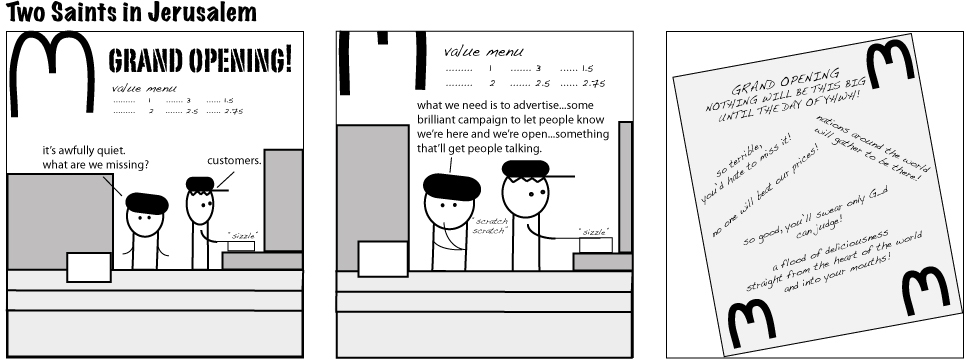
Part 1: Two Saints Risen from the Grave, Meetin’ Jesus and Opening a McDonalds
